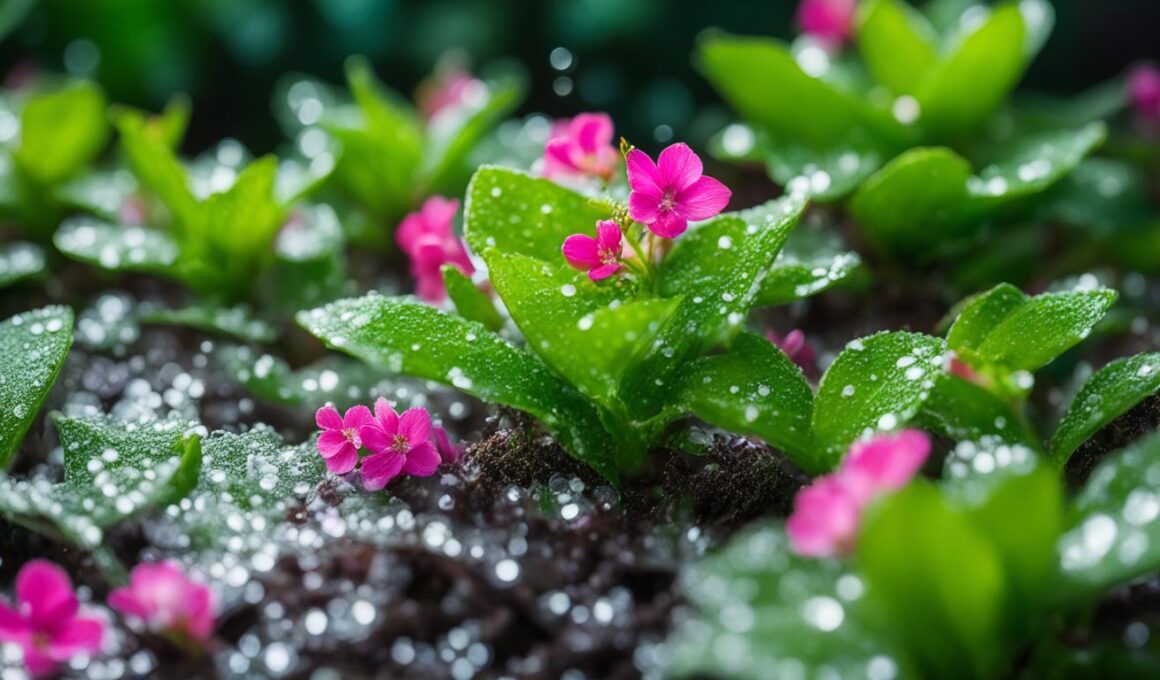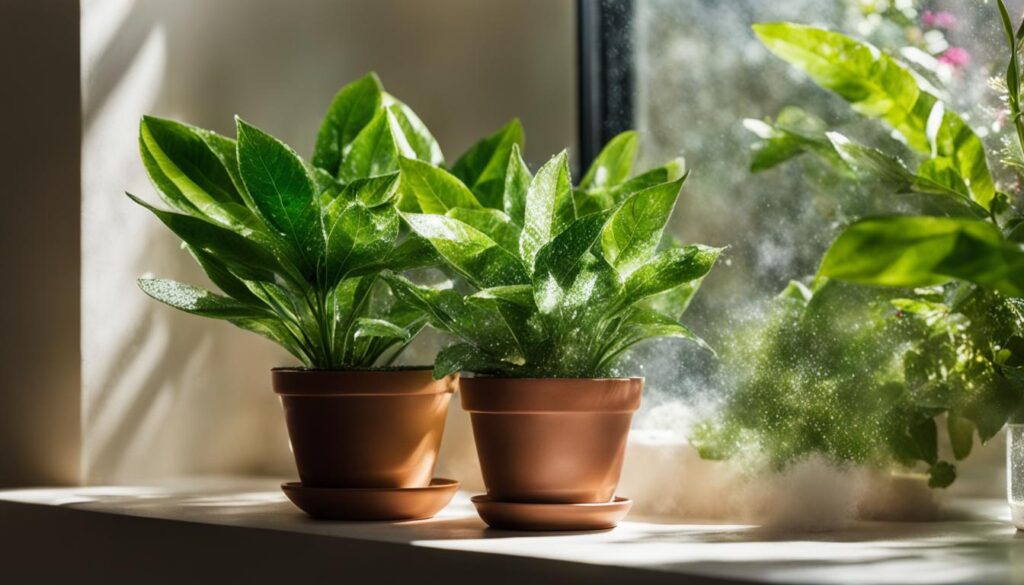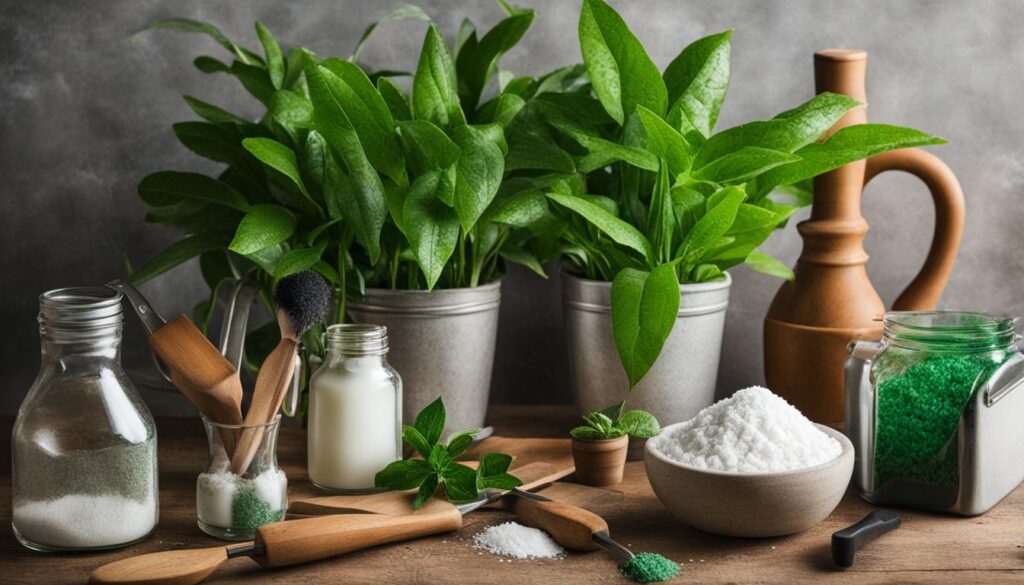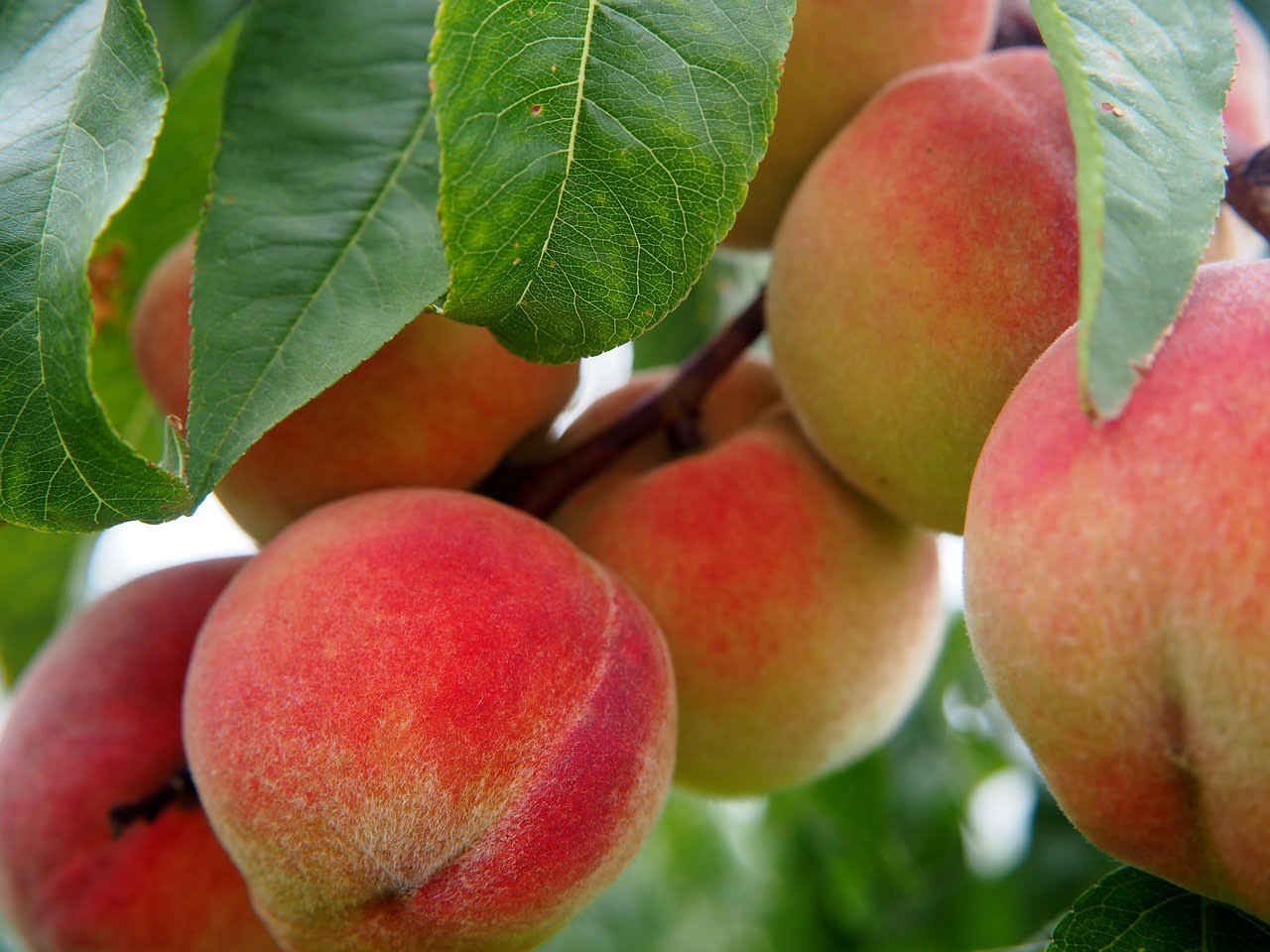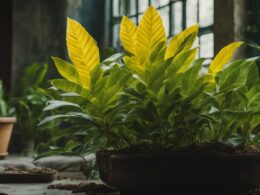Baking soda has become increasingly popular in gardening for its versatile uses and benefits. From acting as a pesticide and herbicide to enhancing the taste of tomatoes, this common kitchen ingredient has found its way into the garden. It can also be used to clean plants, control compost odors, increase blooms, kill weeds, and even measure the pH of soil. However, it’s important to understand which claims have scientific backing and to use baking soda properly for optimum results.
Key Takeaways:
- Baking soda can be used as a natural solution for pest control and plant cleaning in the garden.
- It is important to understand the chemistry of baking soda and its effects on plants, especially in terms of pH levels and nutrient toxicity.
- Baking soda’s effectiveness varies depending on the application, and some claims may have limited scientific evidence.
- While baking soda can be a useful tool for certain aspects of gardening, a balanced approach to plant health is essential.
- Always research and test any new gardening techniques before fully implementing them in your garden.
Understanding Baking Soda in the Garden
Baking soda, also known as sodium bicarbonate (NaHCO₃), is a versatile salt that can have several applications in gardening. When dissolved in water, it separates into sodium ions and bicarbonate ions. It’s important to note that sodium is a necessary nutrient for plants, but excessive amounts can be harmful. Baking soda has an alkaline pH of about 8.3 when dissolved in water, which can have implications for its various uses in the garden.
Understanding the chemistry of baking soda is crucial in understanding its effects on plants. The alkaline nature of baking soda can impact the pH of the soil, which can have significant effects on plant growth. Different plants have different pH preferences, and maintaining the appropriate pH level is essential for their health and nutrient availability. Additionally, the use of baking soda as a pesticide or fungicide relies on its ability to change the pH of the plant’s environment.
It’s important to note that while baking soda has been widely used in gardening, its effectiveness and safety can vary depending on the specific application. The next section will delve into using baking soda in various ways in the garden, exploring its potential benefits and limitations.
Maintaining Optimal Soil pH
Table: Examples of Preferred Soil pH Levels for Common Garden Plants
| Plant Type | Preferred Soil pH Range |
|---|---|
| Tomatoes | 6.0-6.8 |
| Roses | 5.5-7.0 |
| Blueberries | 4.5-5.5 |
| Lettuce | 6.0-7.0 |
It’s important to maintain the optimal pH level of the soil for different plants to ensure their health and growth. Baking soda can be used as a natural way to increase the alkalinity of the soil and raise its pH. However, it’s essential to test the soil’s pH before applying baking soda, as excessive use can result in an overly alkaline environment that may be detrimental to plants. It’s recommended to gradually introduce baking soda while monitoring the pH levels to avoid drastic changes that can harm plant health.
Using Baking Soda in Various Ways
Baking soda has gained popularity for its versatility in the garden. It can be used to combat insects by creating insecticidal solutions, although it’s important to note that neem and other oils can achieve the same results. Baking soda can also help control fungal diseases, such as powdery mildew, by making the leaf surface alkaline. It can be used as a cleaning agent for plants, minimizing compost odors, increasing the number of blooms, and allegedly making tomatoes sweeter. Baking soda can also be a natural weed killer, a poor option as a fertilizer, and can help measure the pH of soil.
To better understand the uses of baking soda in the garden, refer to the table below:
| Application | Usage |
|---|---|
| Insect control | Create an insecticidal solution by mixing baking soda with water and a small amount of dish soap. Spray on plants to repel insects. |
| Fungal disease control | Mix baking soda with water and a small amount of dish soap. Spray on plants to control powdery mildew and other fungal diseases. |
| Plant cleaning | Mix baking soda with water and use it to clean the leaves of plants, removing dust and grime. |
| Minimize compost odors | Sprinkle baking soda on compost piles to reduce unpleasant odors. |
| Increase blooms | Add a small amount of baking soda to water and use it to water flowering plants, promoting bloom production. |
| Tomato enhancement | Some gardeners claim that sprinkling baking soda on tomatoes can make them sweeter. However, scientific evidence supporting this claim is limited. |
| Weed control | Create a weed-killing solution by mixing baking soda, salt, and vinegar. Spray on weeds to kill them. However, this method may also affect nearby plants. |
| Measuring soil pH | Baking soda can be used as a quick and inexpensive method to test soil pH. Sprinkle baking soda on a small soil sample mixed with water. If it fizzes, the soil is acidic. |
It’s important to note that while baking soda can be a useful tool in the garden, some of the claims surrounding its effectiveness have limited scientific evidence. It’s always recommended to conduct further research and consider alternative options when addressing specific gardening needs.
Testing pH Levels and Keeping Plants Fresher
Testing the pH levels of your soil is crucial for maintaining healthy plants. Baking soda can be a handy tool in this process, allowing you to assess the acidity or alkalinity of the soil. By using baking soda, you can adjust the pH levels to create an optimal growing environment for your plants.
To test the pH levels of your soil, simply sprinkle some baking soda on a moist area of the soil. Observe any reaction that occurs. If the baking soda starts to bubble, it indicates that your soil is acidic. This means that you may need to add more baking soda to increase the alkalinity of the soil. On the other hand, if there is no reaction, your soil is likely neutral or slightly alkaline.
Another way to utilize baking soda for plant care is by coating the inside of pots with a thin layer of baking soda before planting. This helps to regulate the pH level of the soil in potted plants, promoting healthier growth and preventing any imbalances that may occur. A balanced pH level leads to stronger roots, improved nutrient absorption, and overall plant vitality.
“Maintaining the right pH levels in your soil is essential for the proper functioning of plant nutrients.”
| Benefits of Testing pH Levels with Baking Soda | Why It Matters |
|---|---|
| Optimal Plant Growth | Plants thrive in soil with the right pH balance. Testing and adjusting pH levels can ensure that essential nutrients are readily available to plants, leading to healthier growth and better yields. |
| Disease Prevention | Many plant diseases thrive in specific pH conditions. By maintaining the right pH levels, you can create an environment that is less favorable for disease development. |
| Nutrient Absorption | Plants can only absorb nutrients when they are in a form that is available to them. Proper pH levels ensure that nutrients are in their preferred form for absorption by plant roots. |
| Improved Soil Structure | Correcting pH imbalances can help improve soil structure, making it easier for roots to penetrate the soil and access water and nutrients. |
Natural Solutions for Pest Control and Plant Cleaning
Baking soda can be a game-changer when it comes to natural pest control and plant cleaning in your garden. Not only is it an affordable and eco-friendly option, but it’s also readily available in most households. Here are some effective ways to use baking soda:
Homemade Fungicide
If you’re dealing with fungal diseases on your plants, a homemade fungicide made with baking soda can be a great solution. Simply mix 1 tablespoon of baking soda, 1 teaspoon of liquid soap, and 1 gallon of water in a sprayer. Shake well and apply to affected areas. The alkaline properties of baking soda help create an unfavorable environment for fungi to thrive.
Ant Control
Baking soda can also be used to control pesky ants in your garden. Mix equal parts of baking soda and sugar, and place it in areas where you’ve spotted ant activity. The sugar will attract the ants, while the baking soda will disrupt their digestive systems, ultimately leading to their demise.
Plant Cleaning and Bird Baths
Baking soda can be a versatile cleaning agent for your plants and bird baths. Mix 1 tablespoon of baking soda, 1 teaspoon of liquid soap, and 1 gallon of water. Use this solution to gently clean the leaves of your plants, removing dust and dirt. For bird baths, sprinkle baking soda on a damp cloth and scrub away any grime or algae that may have accumulated. Rinse thoroughly to ensure no residue remains.
By harnessing the power of baking soda, you can effectively tackle pests and keep your plants and garden accessories clean without relying on harsh chemicals or expensive products.
Debunking Myths and Exploring Limitations
When it comes to using baking soda in the garden, there are several myths that need to be addressed. One common misconception is that baking soda effectively stops black spot on roses. However, scientific evidence does not support this claim. While baking soda can change the pH level of the leaf surface, it does not provide long-term control of black spot.
Another myth is that baking soda can significantly increase the number of blooms in plants. The truth is, baking soda can only enhance the blooms if the plant is specifically sodium-starved. In most cases, providing the necessary nutrients through proper fertilization is a more effective way to promote blooming.
The claim that baking soda makes tomatoes sweeter is also unsubstantiated. The sweetness of tomatoes is determined by various factors, such as the variety of tomato and growing conditions. Baking soda does not have a direct impact on the flavor of tomatoes.
While baking soda can be used as a natural weed control method, its effectiveness is limited. It may provide temporary suppression of weeds, but it is not a long-term solution. Persistent and invasive weeds may require more robust control measures.
Cautionary Notes
It is important to exercise caution when using baking soda in the garden. Excessive amounts can harm plants and alter the pH level of the soil, leading to potential nutrient deficiencies. Before using baking soda on your plants, it is recommended to conduct a small test on a few leaves to assess any negative effects.
Furthermore, while baking soda can be incorporated into homemade fertilizers, its effectiveness is not as significant as other commercially available options. If you are looking to provide essential nutrients to your plants, it is advisable to use fertilizers specifically formulated for the needs of your garden.
In conclusion, while baking soda has its uses in the garden, it is essential to be aware of its limitations and separate fact from fiction. Understanding the science behind its applications and considering alternative methods can help you make informed decisions for the health and well-being of your plants.
Can Baking Soda be Used in Homemade Plant Spray for Bugs?
Yes, baking soda can be used in homemade plant spray for bugs. Mix 1 tablespoon each of baking soda and vegetable oil, and 1 teaspoon of dish soap in a gallon of water. Shake well and spray on plants to deter pests. This homemade plant spray for bugs is eco-friendly and effective.
Conclusion
Baking soda can be a valuable tool in your gardening arsenal, offering natural solutions for pest control and plant cleaning. While its effectiveness can vary depending on the application, it’s important to use it with caution. Remember to research and test any new techniques before fully implementing them in your garden.
When using baking soda, keep in mind that it’s just one aspect of maintaining plant health. A balanced approach to gardening is key. Remember to prioritize plant health by providing proper nutrition, watering, and care.
Overall, baking soda can be a useful addition to your gardening routine, offering natural solutions that can help keep your plants healthy. Just remember to use it wisely, in combination with other gardening practices, and enjoy the benefits of these natural solutions.
FAQ
What are the different uses of baking soda in gardening?
Baking soda can be used as a pesticide, herbicide, fertilizer, and for cleaning plants. It can also control compost odors, increase blooms, kill weeds, and measure the pH of soil.
Is baking soda an effective pesticide?
Baking soda can act as a pesticide, but there are other options like neem oil that can achieve similar results.
How can baking soda control fungal diseases?
Baking soda can be used to make the leaf surface alkaline, which helps combat fungal diseases like powdery mildew.
Can baking soda make tomatoes sweeter?
The claim that baking soda makes tomatoes sweeter is not scientifically supported. Tomato sweetness is determined by other factors.
Can baking soda be used as a fertilizer?
Baking soda is not the most effective option as a fertilizer and should be used with caution. It can be used as a fertilizer in certain mixtures, but there are better long-term options available.
Can baking soda be used to kill weeds?
Baking soda can be used as a natural weed killer, although its effectiveness may vary and it’s not the most efficient option.
How can baking soda be used to test the pH of soil?
By sprinkling baking soda on a moist area of soil and observing if it bubbles, one can determine if the soil is acidic and may require the addition of more baking soda to increase alkalinity.
How can baking soda be used for plant cleaning?
Baking soda can be used to clean plants, bird baths, and garden furniture without the use of toxic chemicals.
Does baking soda effectively stop black spot on roses?
Contrary to popular belief, baking soda does not effectively stop black spot on roses.
Are there any limitations or precautions when using baking soda in the garden?
Excessive amounts of baking soda can harm plants and alter the pH of the soil. It’s important to use baking soda with caution and research any new technique before implementing it fully in the garden.





